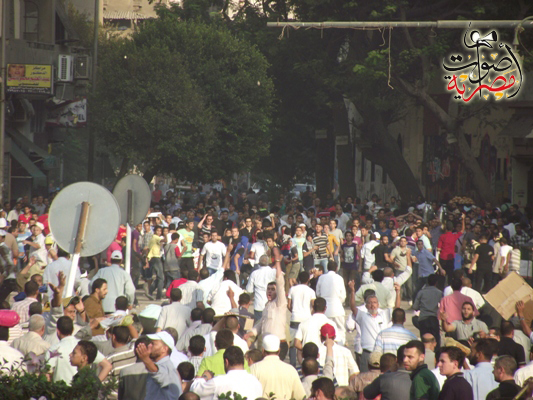Latest NEWS
- Aswat Masriya, the last word
- Roundup of Egypt's press headlines on March 15, 2017
- Roundup of Egypt's press headlines on March 14, 2017
- Former Egyptian President Hosni Mubarak to be released: lawyer
- Roundup of Egypt's press headlines on March 13, 2017
- Egypt's capital set to grow by half a million in 2017
- Egypt's wheat reserves to double with start of harvest -supply min
- Roundup of Egypt's press headlines on March 12, 2017
Nine hurt as gunmen fire at Cairo protesters

Supporters and opponents of Egyptian President Mohamed Mursi clashed in Cairo on Friday, October 12, 2012, where 110 people were injured. Ahmed Hamed/Aswat Masriya
By Yasmine Saleh and Marwa Awad
CAIRO, Dec 11 (Reuters) - Nine people were hurt when gunmen fired at protesters camping in Cairo's Tahrir Square on Tuesday, according to witnesses and Egyptian media, as opponents and supporters of President Mohamed Mursi's plans for a referendum on a new constitution geared up for a day of street demonstrations.
Police cars surrounded the square, the first time they had appeared in the area since Nov. 23, shortly after a decree by the Islamist president awarding himself sweeping temporary powers that touched off widespread protests.
The upheaval in the most populous Arab nation following the fall of Hosni Mubarak last year is causing concern in the West, in particular the United States, which has given Cairo billions of dollars in military and other aid since Egypt made peace with Israel in 1979.
The attackers, some masked, also threw petrol bombs which started a small fire, witnesses said.
Many of the protesters, awakened by the noise, chanted: "The people want the downfall of the regime" - one of the main slogans of the uprising that toppled Mubarak and now adopted by Mursi's opponents. Recorded recitations of the Koran were played over speakers in the square.
"The masked men came suddenly and attacked the protesters in Tahrir. The attack was meant to deter us and prevent us from protesting today. We oppose these terror tactics and will stage the biggest protest possible today," said John Gerges, a Christian Egyptian who described himself as a socialist.
Leftists, liberals and other opposition groups have called for marches to the presidential palace in the afternoon to protest against the hastily arranged referendum on a new constitution planned for Saturday, which they say is polarising the country and could put it in a religious straightjacket.
Islamists, who dominated the body that drew up the constitution, have urged their followers to turn out "in millions" the same day in a show of support for the president and for a referendum they feel sure of winning.
Seven people were killed and hundreds wounded last week in clashes between the Islamist Muslim Brotherhood and opponents besieging Mursi's graffiti-daubed presidential palace.
The elite Republican Guard which protects the palace has yet to use force to keep protesters away from the building, now ringed with tanks, barbed wire and concrete barricades. A decree issued by Mursi late on Sunday gives the armed forces the power to arrest civilians during the referendum.
OPPOSITION SAYS MURSI DESTROYING CONSENSUS
Leftist politician Hamdeen Sabahy, one of the most prominent members of the National Salvation Front opposition coalition, said Mursi was driving a wedge between Egyptians and destroying prospects for consensus.
As well as pushing the early referendum, Mursi has angered opponents by taking sweeping temporary powers he said were necessary to secure the transition to stability after the uprising that overthrew Mubarak 22 months ago.
"The road Mohamed Mursi is taking now does not create the possibility for national consensus," said Sabahy.
If the constitution was passed, he said: "Egypt will continue in this really charged state. It is certain that this constitution is driving us to more political polarisation."
The National Salvation Front also includes Nobel Peace Prize winner Mohamed ElBaradei and former Arab League chief Amr Moussa.
The opposition says the draft constitution fails to embrace the diversity of 83 million Egyptians, a tenth of whom are Christians, and invites Muslim clerics to influence lawmaking.
But debate over the details has largely given way to noisy street protests and megaphone politics, keeping Egypt off balance and ill equipped to deal with a looming economic crisis.
Lamia Kamel, a spokeswoman for Moussa, said the opposition factions were still discussing whether to boycott the referendum or call for a "no" vote.
"Both paths are unwelcome because they really don't want the referendum at all," she said, but she predicted a clearer opposition line if the plebiscite went ahead as planned.
Mahmoud Ghozlan, the Muslim Brotherhood's spokesman, said the opposition could stage protests, but should keep the peace.
"They are free to boycott, participate or say no; they can do what they want. The important thing is that it remains in a peaceful context to preserve the country's safety and security."
The army stepped into the conflict on Saturday, telling all sides to resolve their disputes via dialogue and warning that it would not allow Egypt to enter a "dark tunnel".
The continuing disruption is also casting doubts on the government's ability to push through tough economic reforms that form part of a proposed $4.8 billion IMF loan agreement.










